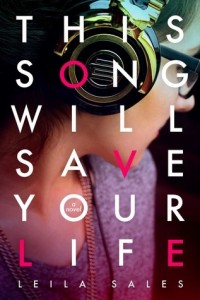 This Song Will Save Your Life by Leila Sales
This Song Will Save Your Life by Leila Sales
Publisher: Farrar, Straus and Giroux (BYR)
Number of pages: 288
My copy: e-ARC from Netgalley
Making friends has never been Elise Dembowski’s strong suit. All throughout her life, she’s been the butt of every joke and the outsider in every conversation. When a final attempt at popularity fails, Elise nearly gives up. Then she stumbles upon a warehouse party where she meets Vicky, a girl in a band who accepts her; Char, a cute, yet mysterious disc jockey; Pippa, a carefree spirit from England; and most importantly, a love for DJing.
* * *
I’ve only read one Leila Sales book, Past Perfect, and I had fun with it because it was so, well, fun. I remember really liking the setting and the characters and how it felt like such a good summer read, so I dove into This Song Will Save Your Life with the same expectations: that this will be a light, fun read, a perfect companion for my recent trip.
But…I was wrong.
I was wrong about the light and fun part, actually. I honestly thought This Song Will Save Your Life is about a girl who builds a playlist and all that, and the “saving your life” part was just metaphorical, a symbolism of sorts. Well, it as kind of like that, but I didn’t expect it to be so serious. In a good way, that is. Elise Dembowski is unpopular, but not because she did something. Or maybe she was unpopular because she tries so hard, too hard. But all Elise wanted was to be seen, to have friends, and when her last attempt failed, she gives up (and this was the part that shocked me and told me that this might be different from the previous Leila Sales book I read). Then Elise discovers an underground warehouse party where she meets people who knew nothing about her and calls her their friend. Ellie finds herself spending more time with them, until she gets into the DJ booth and realizes that there was something else to love about her new secret: DJing.
So this book is about Elise and her quest to fit in, a secret club, and DJing. The last two were a bit unexpected, but it was only unexpected because I didn’t read the summary when I got the book; I just requested it because it was Leila Sales (and the cover was pretty). Like I said, I was surprised at how heavy this book felt at the start, at how big Elise’s problems were to her. I didn’t expect that at all, but that development was gripping enough for me to want to find out what happens next.
The book was a bit slow at the start, and again, because I didn’t read the book’s summary, I wasn’t really sure what would happen. I wasn’t sure about the secret party warehouse angle at first, until the other characters grew on me and I wanted to know what would happen to them. The romantic angle made me cringe a little, and you know how when you read something like that that it was doomed from the start, and you’re not sure how to feel if it didn’t end up doomed? I had that feeling in my stomach while I was reading it. The writing was clear and vivid that I could almost feel how it was to be in that party, to dance and sing with other people as Elise changes the music, to be one with the crowd and all that jazz. And this is coming from someone who doesn’t really party.
The other side of Elise’s life really hurt to read, too, and it made the contrast between her day life and her night life really stand out. It made me realize yet again how high school kids can be mean even if they didn’t intend to — how a simple act of ignorance of another person can really break someone, even if you didn’t intend to do that. There was that particularly mean action made for the sake of “postmodern art” that really got to my nerves, but I liked how it was handled in this book, and how in the end, Elise found a reason to like herself more than wishing that other people like her too. And isn’t that the point? That we be convinced of our worth, to know that it has never been tied to someone else?
I was really liked This Song Will Save Your Life, and I think not knowing what it was about when I first read it contributed to how much I liked it overall. I didn’t end the book wanting to be a DJ, nor wanting to find secret warehouse parties, but I did end it feeling a little bit more compassionate for other people and for myself, too. And I think that’s good enough.
Number of dog-eared pages: 8
Favorite dog-eared quotes:
I thought about how my back hurt from standing and my ears rang. But I also thought about how exciting it had been. How powerful I had felt, knowing that I alone had the ability to make people dance, the ability to make them happy.
I’m telling you, never fall for a music man. It only ends in heartbreak.
True, things don’t stay the same forever: couches are replaced, boys leave, you discover a song, your body becomes forever scarred. And with each of these moments you change and change again, your true self spinning, shifting positions-but always at last it returns to you, like a dancer on the floor. Because throughout it all, you are still, always YOU: beautiful and bruised, known and unknowable.
Rating: [rating=4]
Other reviews:
The Midnight Garden
Good Books and Good Wine

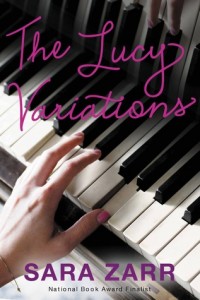 The Lucy Variations by Sara Zarr
The Lucy Variations by Sara Zarr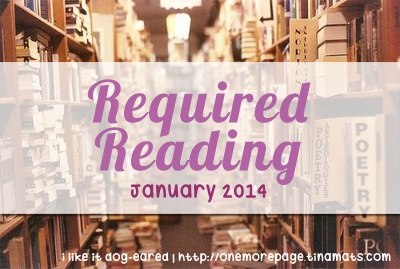
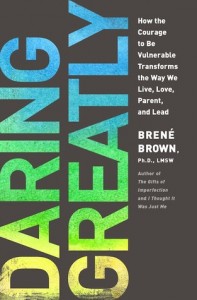 Daring Greatly: How the Courage to Be Vulnerable Transforms the Way We Live, Love, Parent, and Lead by Brené Brown
Daring Greatly: How the Courage to Be Vulnerable Transforms the Way We Live, Love, Parent, and Lead by Brené Brown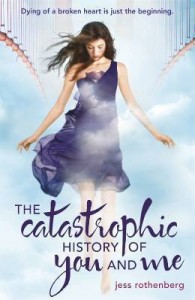
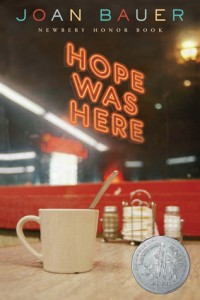 Hope Was Here by Joan Bauer
Hope Was Here by Joan Bauer